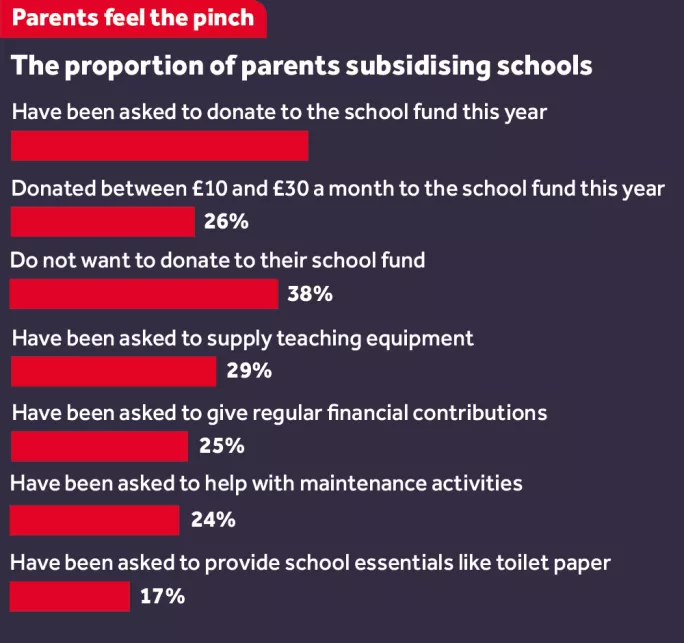Parents asked to buy toilet paper

There have been scores of headlines this year about the number of schools having to go cap in hand to parents to ask for cash.
But now it has emerged that parents are even having to pay for the most basic of items - such as toilet paper - and are frequently being charged to attend music concerts or sports events at their child’s school.
Nearly a third of parents have been asked to supply teaching equipment - such as stationery and books - and almost a fifth of parents have been asked to provide school essentials like toilet paper, according to survey findings shared with Tes.
The findings shine a light on the increasing burden being placed on parents as schools struggle to provide the same facilities and opportunities on squeezed budgets.
The PTA UK survey, of more than 1,500 parents, revealed that around a quarter had been asked to give regular financial contributions or to help with school maintenance activities. More parents (42 per cent) had been asked to donate to the school fund this year than last year (37 per cent).
And there has been a rise in voluntary contributions of between £10 and £30 a month - with 26 per cent donating this amount this year, compared with 21 per cent in 2016.
Michelle Doyle Wildman, acting CEO of PTA UK, says her organisation has noticed a rise in parents having to contribute to supplies such as stationery, books and toilet paper.
“There is a growing number of examples of PTAs being asked to foot the bill for ‘borderline basics’,” she says.
Geoff Barton, general secretary of the Association of School and College Leaders, warns: “This takes us to the very edge of what state education should be doing, if we are starting to ask parents for [toilet paper]. I think parents would be shocked at the thought that the funding crisis is having such a negative impact.”
The findings come as more than a fifth of teachers in a separate Tes-NEU teaching union survey said that their school had asked parents to pay for books, art materials and design-technology supplies.
Other items that parents have been asked to pay for include plants, fans for the classroom and sensory equipment for children with autism, according to the poll of more than 1,800 teachers. In the NEU survey, more than two-thirds of teachers said their school had asked parents to pay for school concerts and sports events in the past year.
Doyle Wildman warns that these kind of charges could fuel inequalities. “I am concerned that where contributions are not voluntary, charging parents in this way may prevent some parents from taking part,” she says.
And her concern is shared by teacher and headteacher unions. Barton says: “The people who will lose out are the parents and children in the most disadvantaged areas.”
Andrew Morris, assistant general secretary of the NEU with responsibility for pay and conditions, echoes this fear, adding: “If the charge is a significant one, schools are denying some parents the opportunity to attend the concerts or the sports events concerned.”
‘Feeling the pressure’
Nearly two-fifths of parents surveyed by PTA UK said that they did not want to donate to the school fund.
But Morris says: “Voluntary donations are not often viewed as such by parents, and they will often feel obliged to make donations, even if they’re not in a position to do so, and pay when they can’t afford it.
“There’s a growing reliance on donations. Schools in better-off areas, with better-off parents, are going to be in a better position.”
Paul Whiteman, general secretary of the NAHT heads’ union, says that headteachers would prefer not to rely on parents to prop up budgets, but have been forced into that position owing to the real-terms cuts that schools have faced in recent years.
“The amount of innovative ways of keeping the books balanced coming through are wider and wider. So it doesn’t surprise me that the parents are beginning to feel the pinch and the pressure,” he says.
“And school leaders don’t like it. They are forced into a position of having to balance their books as there simply isn’t enough money in the system.
“There is no way to hide from that any more. Sufficient funding needs to come through.”
A Department for Education spokesperson says: “No parent is required to make a contribution to their child’s education. The rules are clear on this and no policies have been introduced by this government to allow schools to charge for education provided during school hours and this includes the supply of any materials or equipment.”

You need a Tes subscription to read this article
Subscribe now to read this article and get other subscriber-only content:
- Unlimited access to all Tes magazine content
- Exclusive subscriber-only stories
- Award-winning email newsletters
Already a subscriber? Log in
You need a subscription to read this article
Subscribe now to read this article and get other subscriber-only content, including:
- Unlimited access to all Tes magazine content
- Exclusive subscriber-only stories
- Award-winning email newsletters